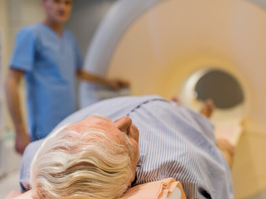relentless medical research is key to transforming the lives of patients with complex and devastating diseases
“i want there to be more people out there like me, with outcomes like mine,” says 59-year-old cancer survivor linda morse.

linda morse had been married to the love of her life, roger francoeur, for only five years when she received a devastating diagnosis. photo: christinne muschi
in december 2017, linda morse of st.-lin, que., felt she was living her best life. after having married young, raised four children to adulthood, and undergone a divorce, morse finally met and married the love of her life, roger francoeur.
five years into newly married life, it seemed as if her fresh start might be abruptly cut short.
morse was experiencing pain in her abdomen and soon learned it was due to a lump on her kidney, diagnosed as early-stage renal cell cancer. she subsequently had her kidney removed, and her urologist assured her she’d need no further treatment or even follow-up appointments. while surprised by the doctor’s advice, she returned to her life with roger to pick up where they’d left off before her diagnosis.
however, one year later, morse, then 56, collapsed with exhaustion after coming home from her job one day. she underwent tests to determine why she was so tired and losing weight. morse and her husband sat in shock as her family doctor, eyes brimming with tears, delivered the news of a devastating diagnosis.
it was far worse than she could have imagined: morse had stage-4 (advanced) cancer. “i asked my physician what this meant, and she told me, ‘it’s critical.’”
advertisement
how critical? a few days later, morse, her husband and adult kids crowded into another oncologist’s office to find out. a biopsy revealed the original cancer had spread rapidly, forming growths in morse’s lungs. the oncologist told morse the only treatment he could offer — a drug that may well have had good results when the cancer was at an earlier stage — could now only buy her time. “i’m a person that likes having facts, so i asked, ‘what kind of time?’,” morse says. “and he told me six months to a year at best.”

shortly before she started treatment, morse arranged for family photos. “i wanted them to have photos because it might have been the last time we would all be together.”
when morse asked about other treatment options, she was referred to a research urologic oncologist at the university of montreal hospital centre (chum), where a specialist recommended a clinical trial with a new infusion treatment. “he said there are no promises, that this was ‘all new’,” morse says. “but i had nothing to lose — here was something that could give me a chance to live.”
that was five years ago.
morse would later learn that countless scientists and researchers around the world, working continuously behind the scenes developing and testing new drugs, were giving people with serious cancers more treatment options than ever before. “there are a lot of steps to bring a drug from the research lab into a patient’s body,” says mary tzortzis, head of clinical operations at bristol myers squibb canada.
advertisement
many of the healthcare researchers carry out that work right here in canada, she adds. “as the canadian research landscape grows and evolves, bms initiates clinical trials with research centres and investigators across the country,” tzortzis says. “we source innovation internally and externally, building on our strong internal r&d, and by tapping into and accelerating the science happening around us.”
but what motivates bms goes much deeper than the desire to drive new science and treatments forward. “not a day goes by without us thinking about patients like linda — their strength and hope fuel our purpose to come to work every day,” tzortzis stresses.
“not a day goes by without us thinking about patients like linda — their strength and hope fuel our purpose to come to work every day.”
while waiting to hear if she would be approved for the infusion treatment, morse arranged a family photo session with her parents, all four of her kids and her two grandchildren. “i told my kids to get dressed up because mom wants pictures,” she says, her voice catching. “really i wanted them to have photos because it might be the last time we would be all together.”
finally, morse got the call she’d been hoping for; she’d been approved to receive the new treatment. “it didn’t mean i was going to be healed, but i felt i was on this journey that might have a better outcome.” two weeks after her sixth infusion, morse received the results of her latest scan: the masses in her lungs had disappeared, leaving only faint scars in their place.
advertisement
that was more than five years ago, and morse remains in remission. in fact, her urologic oncologist just released her from his practice, because he considers her cured of the original cancer. she still has appointments with a medical oncologist for basic follow-ups annually.

morse began her infusion treatment more than five years ago; today she remains in remission.
morse compares the feeling that came over her when she got the news she was in remission to the moments after giving birth when you first hold your baby in your arms — all the pain and effort fades into memory, she says, and is replaced with a sense of contentment, joy and possibility.
morse’s experience has given her a deep appreciation for the enormous effort and dedication that goes into developing medicines that help improve the lives of patients with advanced cancer and other serious diseases. this summer, she’s planning a 60th birthday party where, in lieu of gifts, guests will be asked to donate to cancer research.
“for doctors to have something to prescribe that’s going to work, somebody has to create that something. that’s what researchers and scientists do,” morse says.
“i want there to be more people out there like me, with outcomes like mine,” morse says. “one-hundred per cent of patients need hope and innovative drugs. i’m just an ordinary person with a lot of gratitude. i can’t believe i’m five years [in remission]. it’s like i’ve been given a second life.”
advertisement
this story was created by content works, healthing.ca’s commercial content division, on behalf of bms canada.
 4 minute read
4 minute read





